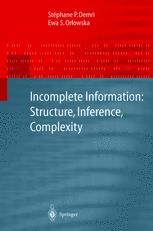

Most ebook files are in PDF format, so you can easily read them using various software such as Foxit Reader or directly on the Google Chrome browser.
Some ebook files are released by publishers in other formats such as .awz, .mobi, .epub, .fb2, etc. You may need to install specific software to read these formats on mobile/PC, such as Calibre.
Please read the tutorial at this link: https://ebookbell.com/faq
We offer FREE conversion to the popular formats you request; however, this may take some time. Therefore, right after payment, please email us, and we will try to provide the service as quickly as possible.
For some exceptional file formats or broken links (if any), please refrain from opening any disputes. Instead, email us first, and we will try to assist within a maximum of 6 hours.
EbookBell Team

4.3
18 reviewsThe construction of any broadly understood theory of information or infor mation processing system involves two major methodological processes: (1) abstraction and analysis, (2) reasoning and computing. This monograph is a realisation of these two processes in relation to the study of incompleteness of information. The paradigm we are working with is inspired by a rough-set approach to data analysis: the formalisms we develop enable the use of a non invasive data representation. This means that the only information which is and must be used in the process of analysis is the actual information that is to be analysed; we do not require any additional sources of information. An abstraction is formed in the process of conception, design, and develop ment of structures. Then analysis leads to a selection of a class of structures. In this book we delineate a class of informational structures that enable us to represent both numerical and non-numerical information and we analyse var ious manifestations of its incompleteness. We discuss several general types of incompleteness of information which are grounded in a rough-set-style view of imprecision and uncertainty. Manifestations of these types of incompleteness in information systems are investigated.